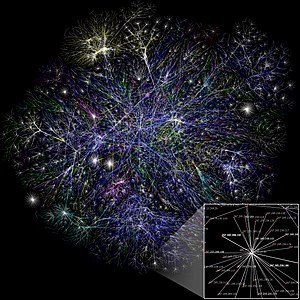
- Visualization of the structure
of a piece of the Internet. from Wikipedia
The main topic of today’s Spanish class was teleadicción – television addiction. To start it off, we had to do a little self-test that would supposedly determine how addicted we are to television. After reading the first question, I immediately had to raise my hand — I couldn’t answer the question, as I don’t have a TV set. It quickly turned out I’m not alone: of the 15 or so that were there today, only two students had a television!
For myself — and I gather that the same applies for most of my classmates — this doesn’t mean I don’t watch any television shows. It’s just that with Internet-enabled computers, you can watch all of that content without a television set.
As we went through the self-test (instead of us all taking it, each of us got to read out a question and the two lone TV owners had to answer) something interesting occurred to me. The Internet, so often blamed for distraction and even the destruction of the attention span, is actually something many of us use to better control our media consumption and the attendant distraction. I can hardly imagine it being a big deal if friends suddenly pop over while I’m watching my favorite show (one of the scenarios in the self-test) — I could just pause it. Another scenario from the self-test, leaving a show on while doing chores, makes sense with a TV; something interesting might be on. Somehow it never occurred to me to do so with the shows I choose to watch. I’d put on music, not a show that would require more attention than I can give.
So while in some ways the Internet produces a lot of distraction, for me it also replaces technologies that were even worse, dictating when I get what content. I wonder if this is a sort of generational shift going on; the Spanish textbook which so brazenly assumed everyone has a TV set is less than 5 years old. I’m sure university students aren’t a representative sample, anyhow. But the consumption of shows might just be another area where the Internet is setting us free.
